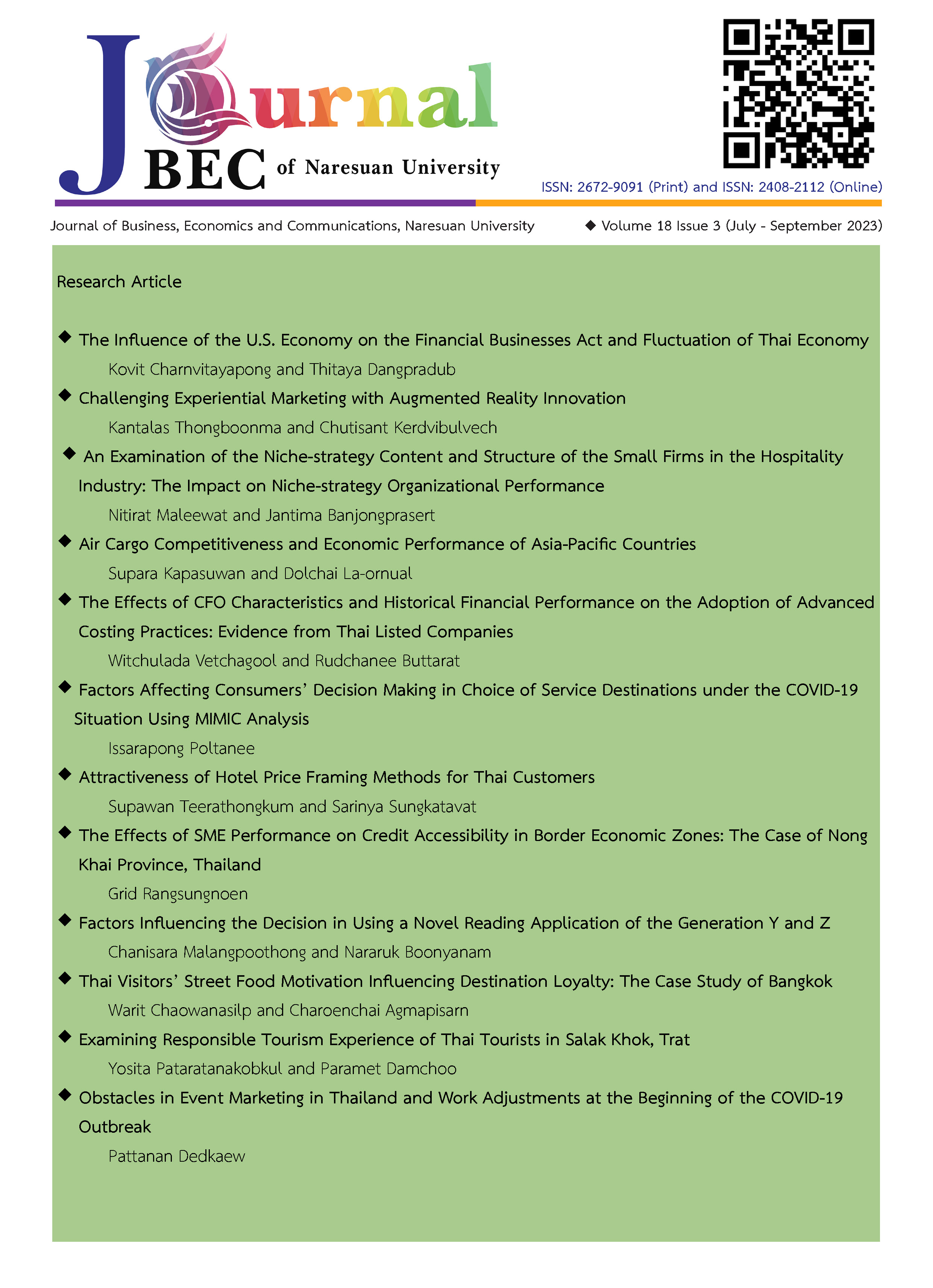Obstacles in Event Marketing in Thailand and Work Adjustments at the Beginning of the COVID-19 Outbreak
Main Article Content
บทคัดย่อ
This qualitative research aimed to investigate the obstacles encountered by event marketers in organizing events in Thailand and the adjustments they made at the onset of the COVID-19 outbreak. Data were collected through interviews with 13 representatives from organizations and event marketing teams in Bangkok, Thailand, between March and September 2020. The results revealed five types of event marketing obstacles, including the target group, environment, team organization, timing, and crisis situations such as the COVID-19 outbreak. To overcome these obstacles, event marketing teams had to adjust in various areas, including attendance management, location selection, inspections, and public relations. In the digital age, Event marketing formats can be tailored to suit different situations by incorporating social media into creative event planning, which can increase audience engagement. The findings suggest that event marketers in Thailand face various challenges, and successful event marketing requires flexibility and adaptability. By making strategic adjustments, event marketers can effectively manage obstacles and engage their target audiences.
Article Details

อนุญาตภายใต้เงื่อนไข Creative Commons Attribution-NonCommercial-NoDerivatives 4.0 International License.
เอกสารอ้างอิง
Chatratichart, W. (April 13-15, 2014). Special Events as Communication Tool to Create Brand Experience: Thai Case Studies. In The 2014 WEI International Academic Conference Proceedings (pp. 34-38). Vienna: The West East Institute.
Dedkaew, P. (2018). Event marketing in digital age. Bangkok: Danex Intercorporation.
Ensurecommunication. (January 23, 2023). Marketing Campaign TOP SPENDER EVENT Brand Likes and good for fans. Retrieved July 14, 2023, from https://www.ensurecommunication.co.th/2023/01/23/campaign-marketing-th/
Handicraft, R., Jindaprasert, K. and Prathum, K. (2021). Identities, Problem, and Obstacles in Marketing Communication of Ban Prasat Archaeologi-cal Site, Non Sung District, Nakhon Ratchasima Province. Interdisciplinary Management Journal, 5(1), 89-100.
Jaiwilai, W. and Sukpetch, K. (2023). Factors related to service selection behavior in health tourism business of Thai elderly tourists in the situation of the COVID-19. Panyapiwat Journal, 15(1), 158-176.
Kanjanaphokin, K. (2012). Event Marketing. Bangkok: Krungthep Turakij.
Kanjanaphokin, K. (2019). Hybrid Event Marketing When Digital and Event Become One. Nonthaburi: Phapphim Printing.
Kasemmethakul, T. and Wiroonrath, S. (2022). Digital marketing strategies for real estate business during the pandemic of Covid-19. Journal of Value Chain Management and Business Strategy, 1(1), 51-66.
Khajornsaksirikul, S. and Phrapratanporn, B. (2020). Social Media Marketing Strategy Influencing the Purchasing Decision on Shopee Website in the Covid-19 Crisis. Journal of Logistics and Supply Chain College, 6(2), 89-101
Krutwaysho, O., Yamma, Y., Srina, P., Julapan, P., Wajanakhampee, T. and Treesuk, W. (2021). Tourism development through the service marketing concept from the perspectives of Gen Y tourism travelling in Chiangmai during the COVID-19 pandemic crisis. Rajapark Journal, 15(41), 242-258.
Khamjam, L. (2022). A study of measures and safety, service quality, and service marketing mix that affect the decision making process for using low cost airline services under the situation of the outbreak of the Coronavirus 2019 (COVID-19). Independent Studies, M.B.A., Bangkok University, Bangkok.
Khampim, T. (2021). The pattern of the presenting the express news on Facebook live for the digital TV. Master thesis, M.C.A., Sripatum University, Bangkok.
Noimanop, K. (2019). A Development of Adversity Quotient of Matthayomsuksa by Group Dynamic Activities. Journal of Education and Social Development, 14(1), 583-592.
Ouparamai, W. and Phongthanapanich, P. (2022). The Adaptation of Digital Marketing Communication for Thai Dessert Shops in Post COVID-19 Pandemic. Rajapark Journal, 16(49), 315-330.
Pearlman, D. M. and Gates, N. A. (2010). Hosting business meetings and Special events in virtual worlds: a fad or the future?. Journal of Convention & Event Tourism, 11(4), 247-265.
Panchuay, D. and Jarutach, T. (2022). Marketing Strategies for Condominium Residential Real Estate, A Comparison of the Promotion Effectiveness of Physical Factors of Sale Gallery and Digital Marketing during the Covid-19 Crisis. Sarasatr, 5(3), 427-439.
Saeyang, C., Laksitamas, P. and Kobayashi, S. (2022). A model of sports marketing management of beverage industry entrepreneurs in sports sponsorship under Covid-19 crisis. Modern Management Journal, 20(2), 116-129.
Sangsawangwatthana, T., Sirisaiyas, N. and Bodeerat, C. (2020). "New Normal" A new way of life and adaptation of Thai people after Covid-19: work education and business. Journal of Local Governance and Innovation, 4(3), 371-386.
Sripol, P., Phakdeeying, R. and Kowithayakorn, V. (2019). Marketing strategy of health-promotional tourism business in the northeast of Thailand. Dhammathas Academic Journal, 19(1), 123-132.
Stoltz, P. G. (1997). Adversity Quotient: Turning obstacles into opportunities. New York: Wiley.
Sutthibut, S., Dhammahaso, P. H. and Vadakovito, P. P. (2020). Promotion of community products with online marketing by Buddhist peaceful mean: a case study of Sawai Sub-District Prangkhu District, Srisaket province. Journal of MCU Peace Studies, 8(sup), 172-184.
Oottamakorn, C. (2017). Potential development project for Thai business to online marketing (offline 2 online B2C). Bangkok: Thammasat University Research and Consultancy Institute.
Wantamail, N. (2014). Marketing Communication (2nd ed.). Bangkok: Kasetsart University.
Wongmonta, S. (Speaker). (May 23, 2018). In Digital Integrated Marketing Communication Training (pp. 4-30). Bangkok: APR Seminar and Training.
Yingyong, N., Yongphet, P., Somkong, K. and Virojrut, T. (2022). Behaviors that are related to customers purchasing decisions and new trends of business after the Covid-19 crisis in the next normal marketing context. Management Science Valaya Alongkorn Review, 3(2), 64-76.


